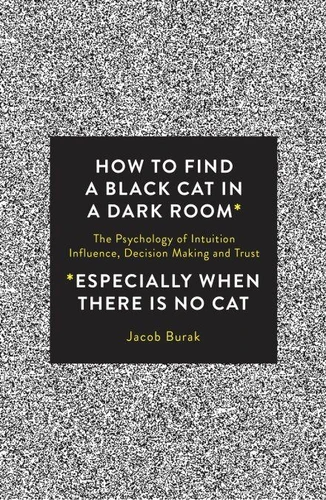How to Find a Black Cat in a Dark Room. The Psychology of Intuition, Influence, Decision Making and Trust
Par :Formats :
Disponible dans votre compte client Decitre ou Furet du Nord dès validation de votre commande. Le format ePub protégé est :
- Compatible avec une lecture sur My Vivlio (smartphone, tablette, ordinateur)
- Compatible avec une lecture sur liseuses Vivlio
- Pour les liseuses autres que Vivlio, vous devez utiliser le logiciel Adobe Digital Edition. Non compatible avec la lecture sur les liseuses Kindle, Remarkable et Sony
- Non compatible avec un achat hors France métropolitaine
 , qui est-ce ?
, qui est-ce ?Notre partenaire de plateforme de lecture numérique où vous retrouverez l'ensemble de vos ebooks gratuitement
Pour en savoir plus sur nos ebooks, consultez notre aide en ligne ici
- Nombre de pages240
- FormatePub
- ISBN978-1-78678-097-3
- EAN9781786780973
- Date de parution17/10/2017
- Protection num.Adobe DRM
- Taille625 Ko
- Infos supplémentairesepub
- ÉditeurWatkins Publishing
Résumé
An inquiry into what it is about our experiences and cultures that brings out the differences and reveals the similarities in us as humans beings, in the vein of Malcolm Gladwell and Daniel Kahneman. Jacob Burak is on a quest to answer the question "are we as human beings, who are separated by different cultures and experiences, similar or different?" Through the lens of behavioural studies, we see how, while our approaches differ and often conflict, we all strive for similar things: love, acceptance, power and understanding. How to Find a Black Cat in a Dark Room offers the latest scientific studies of human behaviour alongside accessible anecdotes to examine the universal human experiences of comparing ourselves to others, the need to belong, the urge to achieve and the anxiety and uncertainty of life itself.
More importantly, Burak shows us how, in understanding these behavioural patterns, we learn that we are actually more alike than we are different; that our rivals often make us stronger; and that being trusting can help us live longer. With his inquisitive nature, logical thinking and engaging style, Burak examines whether it is destiny or personality that controls our lives, through intriguing subjects such as: . What are the ten rules for happiness that are entirely under our control? . Why do smart people make stupid mistakes? . What distinguishes bureaucrats and entrepreneurs? . What are the psychological differences between liberals and conservatives? . In what circumstances is it right to surrender our privacy? . Does it pay to trust people?
More importantly, Burak shows us how, in understanding these behavioural patterns, we learn that we are actually more alike than we are different; that our rivals often make us stronger; and that being trusting can help us live longer. With his inquisitive nature, logical thinking and engaging style, Burak examines whether it is destiny or personality that controls our lives, through intriguing subjects such as: . What are the ten rules for happiness that are entirely under our control? . Why do smart people make stupid mistakes? . What distinguishes bureaucrats and entrepreneurs? . What are the psychological differences between liberals and conservatives? . In what circumstances is it right to surrender our privacy? . Does it pay to trust people?
An inquiry into what it is about our experiences and cultures that brings out the differences and reveals the similarities in us as humans beings, in the vein of Malcolm Gladwell and Daniel Kahneman. Jacob Burak is on a quest to answer the question "are we as human beings, who are separated by different cultures and experiences, similar or different?" Through the lens of behavioural studies, we see how, while our approaches differ and often conflict, we all strive for similar things: love, acceptance, power and understanding. How to Find a Black Cat in a Dark Room offers the latest scientific studies of human behaviour alongside accessible anecdotes to examine the universal human experiences of comparing ourselves to others, the need to belong, the urge to achieve and the anxiety and uncertainty of life itself.
More importantly, Burak shows us how, in understanding these behavioural patterns, we learn that we are actually more alike than we are different; that our rivals often make us stronger; and that being trusting can help us live longer. With his inquisitive nature, logical thinking and engaging style, Burak examines whether it is destiny or personality that controls our lives, through intriguing subjects such as: . What are the ten rules for happiness that are entirely under our control? . Why do smart people make stupid mistakes? . What distinguishes bureaucrats and entrepreneurs? . What are the psychological differences between liberals and conservatives? . In what circumstances is it right to surrender our privacy? . Does it pay to trust people?
More importantly, Burak shows us how, in understanding these behavioural patterns, we learn that we are actually more alike than we are different; that our rivals often make us stronger; and that being trusting can help us live longer. With his inquisitive nature, logical thinking and engaging style, Burak examines whether it is destiny or personality that controls our lives, through intriguing subjects such as: . What are the ten rules for happiness that are entirely under our control? . Why do smart people make stupid mistakes? . What distinguishes bureaucrats and entrepreneurs? . What are the psychological differences between liberals and conservatives? . In what circumstances is it right to surrender our privacy? . Does it pay to trust people?



